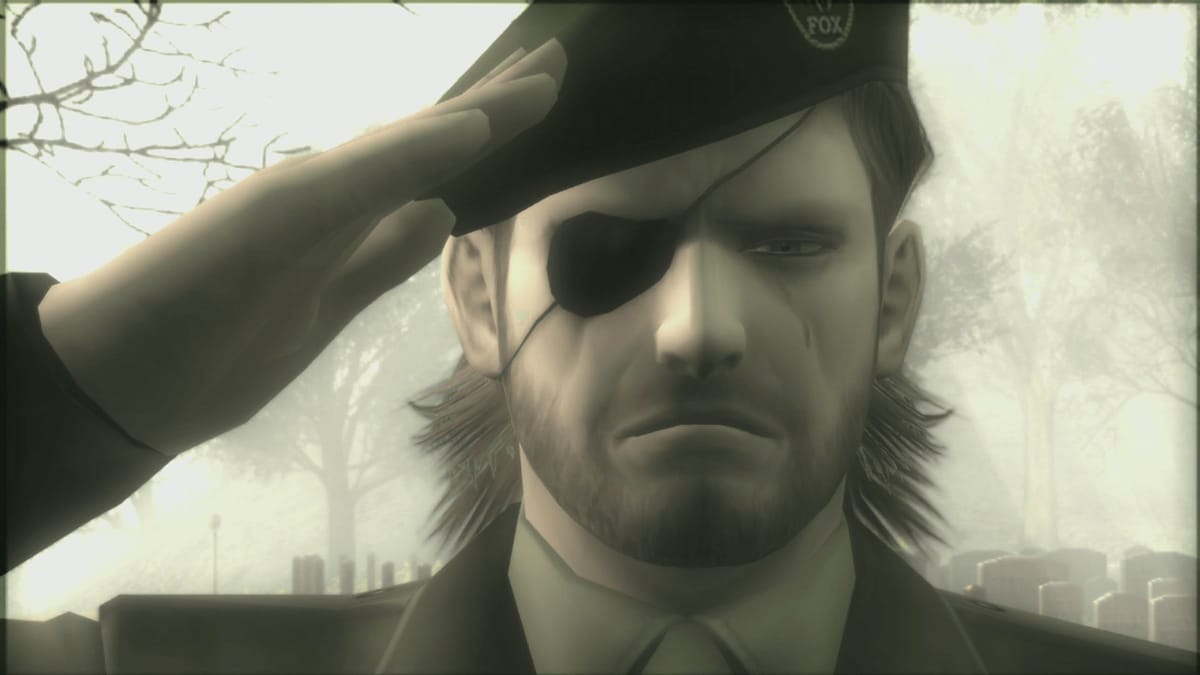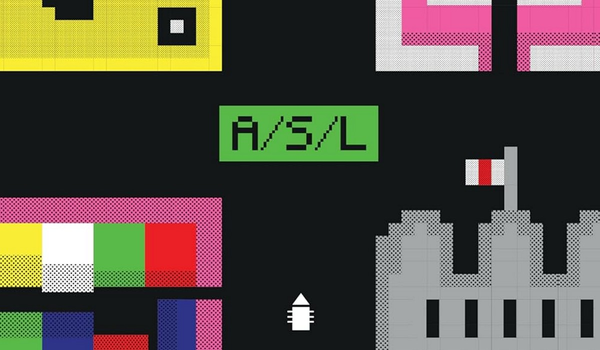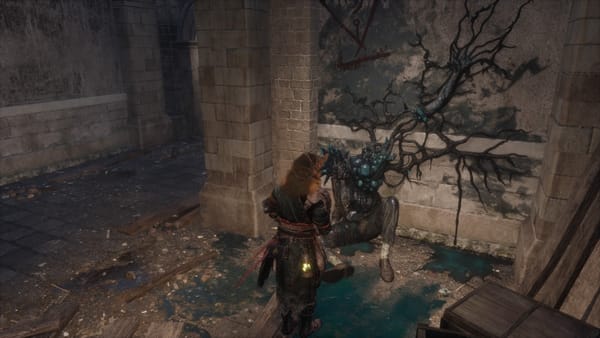Rattlesnake Round-Up
Huh? Metal Gear?1

I’ve been playing Like A Dragon: Infinite Wealth constantly since it was released, and I’ve barely made it to Chapter 5. I’ve become completely absorbed by RGG Studio’s portrayal of Hawaii and American culture. I’ve procrastinated on following the main story to meander in the side waters— the sub-stories have been the absolute brand of kitschy, melodramatic humor Yakuza is known for, and the turn-based combat has been improved with its inclusion of mobility and heightened environmental interactions. I was afraid of how they were going to integrate Kiryiu’s brick-and-brawn style of brawling in a JRPG system, but switching between his different moves and styles for strategic advantages marks him as a unique member of Ichiban’s party.
But we’re not here to talk about Infinite Wealth. The February article is about violence in gaming and Condemned: Criminal Origins, hoping to provide tasteful criticism of the well-liked horror game. January 28th is Rattlesnake Roundup Day, according to the very chic, artistic calendar I purchased from my friends. Nothing makes me think of snakes more than the cinematic Metal Gear Solid series, especially its third mainline entry Snake Eater. For this short article, rather than bombard you with details about the game, I simply want to complain and contemplate. I think the upcoming remake of Snake Eater is an insidious attempt by Konami to endear themselves to fans after the absolute butchering of the franchise that was Metal Gear: Survive and their mistreatment of beloved videogame auteur Hideo Kojima.
I am not particularly opposed to or in favor of remaking classic games. On one hand, remaking games is an accessibility and preservation issue — it allows future generations to experience games from decades past with modern sensibilities and updated graphics. On the other: it showcases the artistic bankruptcy of gaming as a whole, where known franchises and series are remade and remastered ad nauseam, rather than investing in new, creative, original IPs.
I’m not opposed to Snake Eater Delta because of some general aversion to remakes, but simply hold the personal opinion that it’s odd the best Metal Gear Solid game is being remade without any oversight from its original creator and, well, I don’t think Snake Eater needs to be remade. I’ve come to find it’s been a bit of a fangirl response, and a bit unfair, not to the company that betrayed Kojima (my beloved) but to the fact that Snake Eater could use some improvements offered by a contemporary gaming lens.

I have been wrong before when it comes to remakes. I had the same gag response when the Resident Evil 4 and Dead Space remakes were announced, and they both turned out to be absolute bangers. Neither had the original creators involved either: Glen Schofield was nursing his wounds after the disastrous Callisto Protocol release and Shinji Mikami was off doing…whatever the fuck Mikami does in his spare time.
I admit that Snake Eater could do with a modern rework. The control scheme is a bit archaic, why press three different buttons to aim and shoot when two triggers can do just fine? It’s charming in its own way: the clunky controls add a certain weight to Naked Snake’s movements and actions, feeding the immersion of crawling through the muddy jungles of Tselinoyarsk (USSR).
Snake Eater’s choice-variety can be re-interpreted with the control and traversal mechanics set forth by Phantom Pain. Both games gave you plenty of options when dealing with obstacles. When given a mission to destroy 3 radio transmitters in Phantom Pain, I thought to complete it in three different ways:
- I could go sneaky-deaky-like, pulling soldiers into a tight snooze, unseen, shadow incarnate. I would then place three different C4 charges on each transmitter. I could even get a little giddy with the last one and double up on the explosives. I would then ride off into the night with my trusty steed, detonating the charges and trotting off like a demolition bandido. In-out, unseen. Like a ghost.
- Go in, hot and heavy, hard and fast. Guns-blazing, careful use of cover and headshots. Blow up the transmitters with grenades. In and out, leaving a trail of hellfire. Like a demon.
- I would perch over the cliff that overlooked the encampment, and use my handy rocket launcher to quickly destroy the three transmitters. The high ground could give me a great advantage in the upcoming skirmish, but I could focus on destroying the targets and then easily avoid the enemy by retreating away from the cliff face. In and out, carefully, tactfully. Like a strategist.
Snake Eater engaged in playful variety, focused more intensely on the consequence of your choices, not in the “Choices matter! Your choices will affect the story!” shtick, but instead playing in the field where your choices really matter: the gameplay progression.
In the early game, off the beaten path, you can find an enemy camp with a helicopter. If you manage to blow up the helicopter, it will no longer hunt you when you ascend a mountain later on in the game. The boss fight against The End, an elderly sniper, can be skipped either by shooting his wheelchair when first introduced to him or by simply waiting him out and having him die of old age. The soldiers you kill will haunt you during The Sorrow boss fight, extending the river crawl of death, forcing you to confront your sins. Furthermore, the open jungles can be expanded into the vast vistas we know from Phantom Pain, and the Unreal engine can give Snake Eater a modern spin. Both games can bleed easily into each other due to them both possessing variety of gameplay and an emphasis on player choice and its consequences.
My affinity for the remaster will not only depend on the improvement of its mechanics, but on how they affect, touch-up or re-write the story, as I believe Snake Eater’s themes are relevant even in today’s world, and should remain untouched.

John, codename Naked Snake, works as a spy for a newly formed American tactical espionage unit during the Cold War. After a failed attempt to extract a Soviet scientist famed for his creation of weapons of war, Snake is betrayed by his mentor, aptly named The Boss, who has defected to the USSR. She assists Colonel Volgin in setting off a small nuclear explosion, which devastates the neighboring region. This causes tension between the Kremlin and the White House, who accuse the United States of the attack, both sides fear the escalation will be the birth of a new nuclear war. To settle the matter, Snake is given three mission objectives to defend America’s innocence on the matter:
- Stop Volgin’s faction
- Destroy the Shagohod, a proto-Metal Gear with nuclear firepower
- Kill The Boss
This is a brief set-up of the plotline, spoilers for the nearly twenty-year-old game below. You have been warned.
All of Kojima’s entries in the Metal Gear series are staunch anti-war games. They showcase not only the devastation of armed conflict, but how they affect individuals on a personal level — the burden soldiers carry when they commit atrocities and violence for their country. The game deals with themes of patriotism and nationalism.
The Boss is the only true patriot in the game. She willingly accepts the brand of traitor and death at the hands of her former mentee, all for the love of her country. She was acting as a double spy of sorts, aiding a shadowy organization that controls world politics and economies. In this, we see the sad reality of being a soldier. Your country will never love you as much as you love it. Clinging to ideas demarcated by borders and nationality only portends doom. To the Boss, it cost her everything. Her lover, her child, her own life was lost in the service of her country. History will forever mark her as a disgrace, an enemy of the country she poured everything into. How insidious American exceptionalism is, that it kills even those who love it.
In 2024, a year already marked by continuous war and genocide in Palestine, this criticism of patriotism and nationalism is more apt than ever. I worry that any alterations to the story might betray these important cultural conversations. Snake Eater has made me cry. It has marked me as a human being. Not only did it help cultivate my political ideals, it helped root my deep-seated hatred for war and my disgust at the casual loss of innocent lives, and the powers that be that fund that shit. Violence is, and forever will be, a burden, not something that should be used lightly and without context (and woah will we touch on these topics in the February article). If the Snake Eater remake can pull my heartstrings and further cultivate these political narratives, I’m all for it. For now, I stay cautious, as I don’t particularly trust the seedy company behind the Delta re-imagining, and instead place my faith in its developers, the laborers of the industry, to continue Hideo Kojima’s message.






